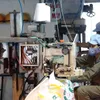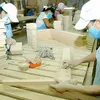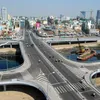Japan to continue support for City
Hirotaka Yasuzumi said JETRO has organised many business-matching events, exhibitions and others to boost co-operation between Vietnamese and Japanese firms in supporting industries, but the same Vietnamese participants attend again and again, and not many "new faces" took part.
Therefore, JETRO would co-operate with relevant ministries, industries and localities to identify "new" companies that have the capability to co-operate with Japanese firms, he said.
Most businesses in supporting industries are small or medium-sized, have modest resources and management, and use outdated technologies, resulting in inconsistent quality for their products, he said.
This is a challenge for Japanese firms seeking local content to serve their expansion plans, he said.
Opacity of information is an obstacle to collaboration between Japanese and Vietnamese firms, especially in supporting industries, he said.
State firms are reluctant to release information, making it hard for foreign companies, including Japanese, to study potential business partners, he explained.
Japanese firms expect the Government and local authorities to better manage State-owned enterprises to ease this problem and to have more support policies for SMEs to mitigate their lack of capital and technologies.
According to JETRO, the rate of locally-made products supplied to Japanese producers in Viet Nam has increased significantly compared to many years ago but remained low compared to other countries in the region.
Yasuzumi said foreign direct investment in Viet Nam, especially Japanese, would continue to rise meaning local manufacturers would be called on to supply more products to foreign investors.
The Government has passed a decree on developing supporting industries and HCM City has policies in place to boost their development.
Yasuzumi said the city should make use of legal documents innovatively to come up with clear policies such as offering financial guarantees for companies without assets to mortgage and set up funds to support businesses.
Viet Nam's environmental policies are outdated compared with other countries, and to minimise environmental impacts, most localities, including HCM City, have curtailed industries that potentially affect to the environment.
Localities should allow enterprises to invest in such industries with the caveat that they must use advanced eco-friendly technologies, he said, explaining that this would help boost supporting industries.
In 2016-20 the city would focus on developing four major industries — mechanical engineering, electronics and information technology, rubber and plastics, and food processing — and the two traditional industries of garment and textile and footwear, especially their supporting industries.





